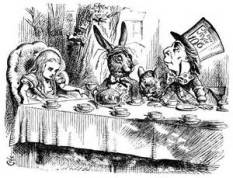It's
a lovely tale about a woman who takes the finest perfume, very
expensive stuff, and pours it on the feet of Jesus and wipes it with her
hair. It's a very submissive act, a gentle thing, a sign of great
admiration and love, and perhaps longing and regret and grief. Jesus is
not going to be with them much longer. Does she know this? I suspect so,
some part of her is aware that time is short. She's been saving this
perfume for a long time and perhaps she has asked herself, "what am I
saving this for?" We do that with our nice things, tuck them away for a
special occasion. This is perfume that could have been used for a
burial, an attempt to show your honor and respect for somebody you loved
that has passed on, but how sad if she had waited. Why should we not
pay tribute to the living, let them know how much they mean to us, fill
the air with the fragrance of our love?
Why are you bothering her? She has done a beautiful thing to me.
The
telling of the tale really reveals some things about the nature of men
and women, about how we relate to each other, about the different ways
we perceive the world. Each version of the event tells you a little bit
about what's in the heart of each of those disciples. Matthew and Mark
report the disciples were indignant about the woman's act. Luke wants
everyone to know she was a sinful woman, a woman in that town who lived a
sinful life. Some report she anointed Christ's head, some report His
feet, most likely she did both.
John
tells us about Judas Iscariot who is particularly peeved, on account of
the fact that he has been dipping into the money bag and helping
himself. Judas, who would later betray Jesus, is quick to point fingers
and condemn this woman. In his eyes, she's just wasted the equivalent of
a years wages, precisely his own sin. He himself has been siphoning off
money, wasting it so to speak.
That
is the teaching that really resonates with me in the re-telling of this
event, the way we tend to judge others through the eyes of our own sin.
We do like to project our own flaws and faults onto other people,
almost as if they were mirror images of our own selves, and when we see
our own selves reflected in another, we are often rather horrified by
what we see.
"...whoever has been forgiven little, loves little."
Judas
sees waste in this woman and thievery. Luke sees her alleged sinful
past, likely of a sexual nature. John is amusing, he wants us to know
that Martha was busy serving, while this woman apparently was not. But
Martha is doing all the work, while this other woman is getting all the
attention!
What
Christ sees is incredibly profound. He sees everything, each of them
attempting to project their own sin upon this woman. He also sees the
beauty at his feet, the tribute she is paying to Him, the love she is
showing. He knows what is in her heart too, and He does not let the
disciples make ugly what she has done.
That
taking of what is beautiful and attempting to make it ugly is such a
typical and rather unpleasant characteristic of human beings. Jesus
tells Luke, her many sins have been forgiven—as her great love has shown...whoever has been forgiven little, loves little."
She
loves greatly, deeply, passionately, because she knows her own self,
she knows her own sins, and she understands the depth and the power of
Christ's love, the true meaning and value of forgiveness and acceptance
and mercy.
Those
who do not are simply caught in a pride trap, carrying a burden far too
heavy for us to carry alone, so we are compelled to try and share the
misery with others. The sad thing about that is that even if other
people try to lay beauty at your feet, you cannot see it, because all
you can see is your own self down there, looking back at you with eyes
full of condemnation and judgement.
Truly I tell you, wherever the gospel is preached throughout the world, what she has done will also be told, in memory of her.















